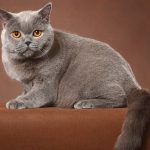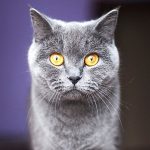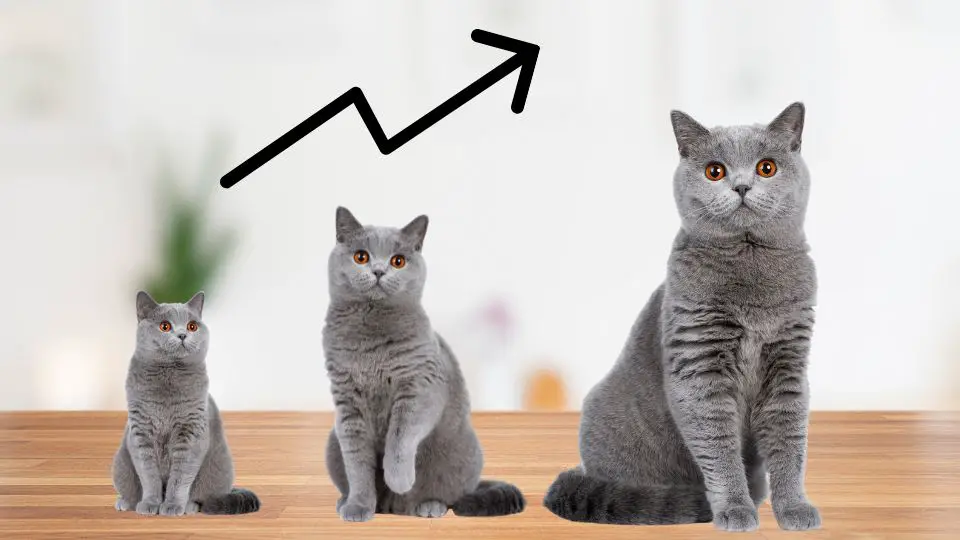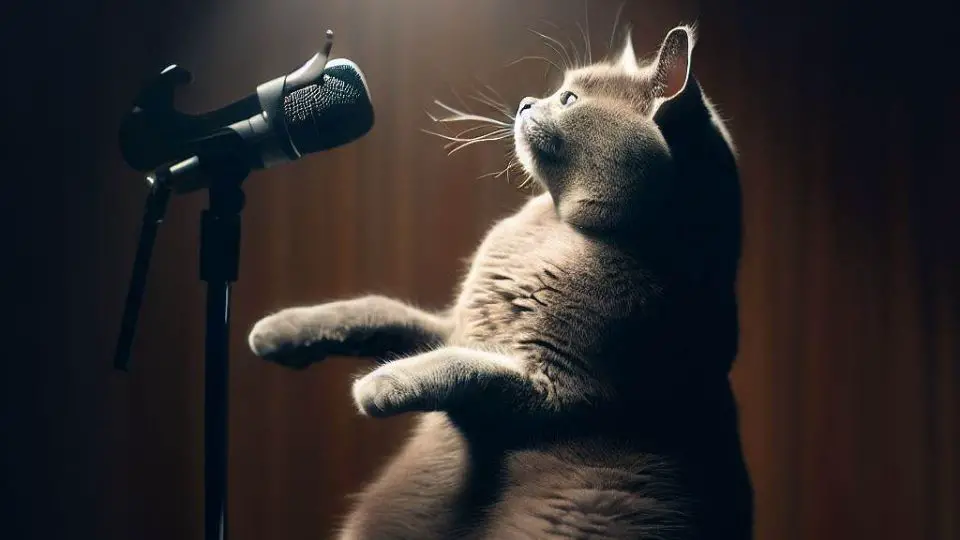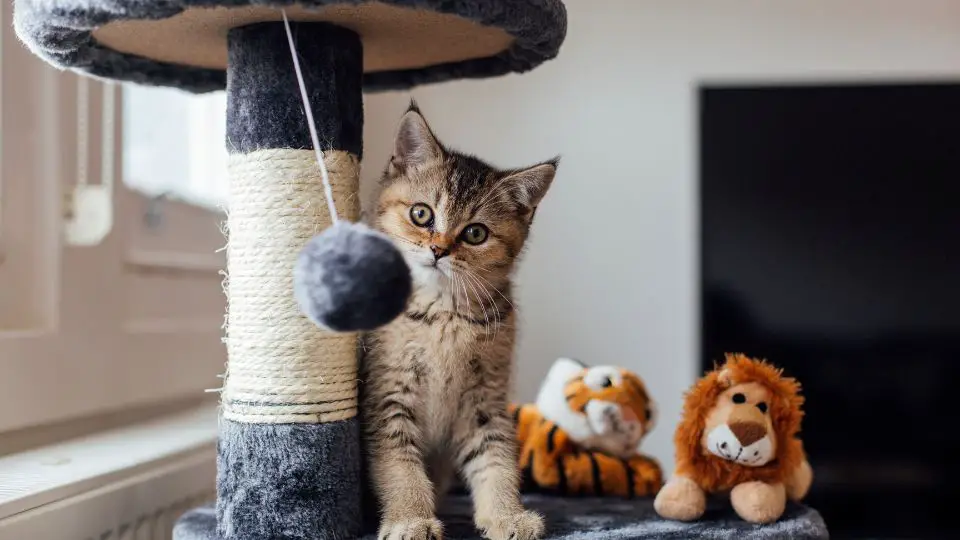British Shorthair cats are known for their sturdy build and round, plush appearance. However, if you notice that your British Shorthair is looking skinny or underweight, it may be a cause for concern.
A healthy weight is important for a cat’s overall health and well-being, and there are different factors that can impact a cat’s weight and body condition.
In this article, we will explore the different reasons why your British Shorthair may be skinny and provide tips on how to address any potential health concerns.
Is my British Shorthair underweight?
If your British Shorthair is well under 8 pounds in females or 9 pounds in males, it is underweight and it is imperative to take it to the vet as soon as possible so any issue can be adressed immediately.
Here are some more ways to determine whether your British Shorthair is underweight or not.
- Body Condition Score: The body condition score is a visual assessment of your cat’s body shape and muscle mass. It can be scored on a scale of 1 to 9, with 1 being severely underweight and 9 being severely overweight. A score of 4 or 5 is considered ideal for a British Shorthair cat.
- Weighing Your Cat: Weighing your cat regularly can help you determine if they are maintaining a healthy weight. You can use a digital scale or visit your veterinarian to have your cat weighed.
- Visual Assessment: A visual assessment of your cat’s body shape and muscle mass can also help you determine if they are underweight. Signs of underweight cats include extremely visible ribs, a sunken abdomen, and a prominent spine and hip bones.
Why is my cat very skinny but eats?
Possible Causes of Skinny Cats Who Still Eat
- Hyperthyroidism: Hyperthyroidism is a condition in which the thyroid gland produces too much thyroid hormone. This condition can cause weight loss despite a good appetite, as well as increased thirst, urination, and restlessness.
- Diabetes: Diabetes is a condition in which the body is unable to regulate blood sugar levels. In cats, diabetes can cause weight loss despite an increased appetite, as well as increased thirst, urination, and lethargy.
- Parasites: Parasites, such as fleas, ticks, and worms, can interfere with a cat’s ability to absorb nutrients from their food, causing weight loss despite a good appetite.
- Dental Problems: Dental problems, such as tooth decay, gum disease, or abscesses, can make it difficult for cats to eat and cause weight loss.
- Cancer: Cancer can cause weight loss in cats, as it can interfere with the body’s ability to absorb and utilize nutrients.
Ideal British Shorthair weight by age
For Male British Shorthair Cats:
- Kitten (up to 6 months): 2-4 pounds (0.9-1.8 kg)
- Junior (6-12 months): 4-8 pounds (1.8-3.6 kg)
- Adult (1-3 years): 9-12 pounds (4.1-5.4 kg)
For Female British Shorthair Cats:
- Kitten (up to 6 months): 2-4 pounds (0.9-1.8 kg)
- Junior (6-12 months): 4-8 pounds (1.8-3.6 kg)
- Adult (1-3 years): 8-11 pounds (3.6-5 kg)
Keep in mind that each cat is unique and may have different body types and metabolisms. Consult with your veterinarian for personalized recommendations for your cat’s specific dietary needs and ideal weight range.
If your British Shorthair is a bit out of above range does not necessarily represent a concern, but it might be time to take actions decribed below in this article to prevent him getting overweight.
What to do if your British shorthair is too skinny
If you notice that your British Shorthair cat is becoming skinny or losing weight rapidly, you have to take action as soon as possible to identify and address the underlying cause. Here are some steps you can take to help your cat regain a healthy weight:
- Schedule a Veterinary Appointment: Schedule an appointment with your veterinarian to have your cat examined and to rule out any underlying medical conditions.
- Adjust Their Diet: If your cat is not eating enough, consider changing their diet to a high-quality cat food that is high in protein and nutrients. Consult with your veterinarian for personalized recommendations for your cat’s specific dietary needs.
- Encourage Eating: Encourage your cat to eat by offering them wet food, which is more palatable and easier to digest than dry food. You can also try hand-feeding your cat or feeding them small meals throughout the day.
- Treat Dental Problems: If your cat has dental problems, schedule a dental cleaning with your veterinarian to remove any buildup of plaque or tartar.
- Minimize Stress: Minimize stress in your cat’s environment by providing them with a comfortable and secure living space and minimizing any changes to their routine or environment.
- Treat Underlying Conditions: If your cat has an underlying medical condition that is causing the weight loss, work with your veterinarian to develop a treatment plan to manage the condition and help your cat regain a healthy weight.
- Monitor Progress: Monitor your cat’s progress by weighing them regularly and assessing their body condition score. Consult with your veterinarian if you have any concerns or questions.
By identifying the underlying cause and working with your veterinarian to develop a treatment plan, you can help your cat achieve and maintain a healthy weight. By providing your cat with a high-quality diet and monitoring their progress, you can help ensure that your British Shorthair cat is healthy and happy.
Proper diet for skinny British Shorthair
If you have a British Shorthair cat that is skinny, ensure that they are receiving a proper diet to help them gain weight and maintain a healthy body condition. Here are some tips and guidelines for creating a proper diet for skinny British Shorthair cats.
- High-Quality Cat Food: Feeding your cat a high-quality cat food that is rich in protein, essential vitamins, and minerals is crucial for maintaining a healthy weight. Look for cat foods that contain real meat as the first ingredient, and avoid foods that contain fillers and artificial additives.
- Frequent Meals: Skinny cats may benefit from frequent meals throughout the day, rather than one or two large meals. Try feeding your cat smaller meals 3-4 times a day, and monitor their weight to see if they are gaining or maintaining weight.
- Wet Food: Wet cat food is often more palatable and easier to digest than dry food, making it a good option for skinny cats who may have a poor appetite. Wet food also contains more moisture, which can help with hydration and digestion.
- Nutritional Supplements: Adding nutritional supplements, such as omega-3 fatty acids or probiotics, to your cat’s diet can help improve their overall health and well-being. Consult with your veterinarian for personalized recommendations for your cat’s specific needs.
- Treats: Treats should be given in moderation and should not make up a large portion of your cat’s diet. Look for high-quality, nutrient-rich treats that can supplement your cat’s diet and provide extra calories.
- Water: Providing clean, fresh water is crucial for maintaining your cat’s health and hydration. Make sure your cat always has access to clean water, and consider adding a water fountain to encourage them to drink more.
Can I make my cat reach its full size?
The short answer is not really. While proper nutrition, exercise, and veterinary care are important for a cat’s health and well-being, genetics play the most significant role in determining a cat’s size and growth rate. The size of a cat is determined by its genes and inherited from its parents, just like with humans. No amount of food or exercise can change a cat’s genetics.
In fact, overfeeding your cat in an attempt to make them weight more can actually lead to health problems such as obesity, which can have negative impacts on their overall health and lifespan. Provide your cat with a healthy, balanced diet and regular exercise to maintain their optimal weight and health, but this will not change their genetics or alter their size.
How genes can make your British Shorthair look skinny
Genes play a significant role in determining the physical appearance of cats, including their size and body composition. In the case of British Shorthair cats, there are certain genes that can make them look skinny or lean, even if they are receiving adequate nutrition and care. Here’s a closer look at how genes can impact the appearance of British Shorthair cats.
- Body Type: British Shorthair cats come in different body types, including cobby and semi-cobby. Cobby cats have a more compact, rounded body shape, while semi-cobby cats are slightly longer and leaner. If your British Shorthair cat has a semi-cobby body type, they may appear thinner or more slender than a cobby cat of the same weight.
- Coat Color and Pattern: Coat color and pattern can also play a role in how skinny or lean a British Shorthair cat appears. For example, cats with a lighter-colored coat may appear thinner than those with darker coats, as the dark color can create the illusion of bulk. Additionally, cats with a solid coat color may appear thinner than cats with a patterned coat, as the patterns can break up the cat’s silhouette.
- Metabolism: Just like with humans, cats can have different metabolic rates, which can impact their body composition. Some cats may have a faster metabolism, which means they burn calories more quickly and may appear leaner than cats with a slower metabolism.
- Health Issues: While genetics can play a role in a cat’s appearance, you should rule out any underlying health issues that may be causing your British Shorthair cat to appear skinny. Conditions such as hyperthyroidism or gastrointestinal disorders can impact a cat’s weight and overall health.
If you are concerned about your British Shorthair cat’s appearance or weight, consult with your veterinarian to rule out any underlying health issues and develop a personalized nutrition and exercise plan for your cat’s specific needs. While genes can impact a cat’s appearance, proper nutrition, exercise, and veterinary care are crucial for maintaining their health and well-being.
Explain how not being pure bread along the line of ancestors might affect the weight
How a cat’s diet as a kitten affects its size
The diet of a kitten is crucial to its overall growth and development, including its size as an adult cat. The nutrients and calories that a kitten receives during its early stages of life can impact its future size and weight, as well as its overall health and well-being. Here’s a closer look at how a cat’s diet as a kitten can affect its size as an adult.
- Protein: Protein is an essential nutrient for a kitten’s growth and development, as it supports the development of lean muscle mass. Kittens require higher amounts of protein than adult cats, with recommended levels ranging from 30-40% of their diet. A lack of protein during kittenhood can lead to stunted growth and smaller size as an adult cat.
- Calories: Kittens have higher caloric needs than adult cats due to their rapid growth rate. A calorie deficiency during kittenhood can lead to slower growth and a smaller adult size, while overfeeding can lead to obesity and potential health problems. Feed your kitten a high-quality, balanced diet that meets their specific caloric and nutritional needs.
- Nutrients: In addition to protein and calories, a kitten’s diet should also provide adequate amounts of essential nutrients such as vitamins and minerals. Calcium, for example, is essential for the development of strong bones and teeth, and a deficiency can lead to skeletal abnormalities and smaller adult size.
- Timing: The timing of a kitten’s diet is also important for optimal growth and development. Kittens should be fed small, frequent meals throughout the day to support their rapid metabolism and growth rate. You should also transition kittens to adult cat food gradually to avoid digestive upset and ensure that they receive proper nutrition throughout their growth stages.
Does a skinny cat always means unhealthy cat?
Note that a skinny cat doesn’t always mean an unhealthy cat, and you should understand the different factors that can impact a cat’s weight and overall health. Here’s a closer look at whether a skinny cat always means an unhealthy cat.
- Body Type: Cats, like humans, come in different body types, and some cats may naturally be more slender than others. A cat’s body type can impact its overall weight and appearance, with cobby cats having a more compact, rounded body shape, while svelte cats are longer and leaner. If your cat has a naturally lean body type, they may appear skinny even if they are receiving proper nutrition and care.
- Age: As cats age, their metabolism and dietary needs may change, which can impact their weight and body condition. Senior cats, for example, may experience muscle loss and weight loss as they age, even if they are eating a balanced diet. Monitor your cat’s weight and overall health throughout their life stages to ensure that they receive proper care and support.
- Health Issues: While some cats may be naturally lean or have a fast metabolism, a skinny cat can also be a sign of underlying health issues. Conditions such as hyperthyroidism, diabetes, or gastrointestinal disorders can impact a cat’s weight and overall health, and you should consult with your veterinarian if you notice any changes in your cat’s weight or appearance.
- Nutrition: Adequate nutrition is crucial for maintaining a healthy weight and overall health in cats. A lack of proper nutrition can lead to weight loss and malnutrition, while overfeeding can lead to obesity and potential health problems. Feed your cat a high-quality, balanced diet that meets their specific nutritional needs and to monitor their weight and overall health regularly.
Conclusion
In conclusion, if you notice that your British Shorthair is looking skinny or underweight, it’s important to address the issue to ensure your cat’s overall health and well-being. There are different factors that can impact a cat’s weight and body condition, including body type, age, health issues, and nutrition.
By consulting with your veterinarian and taking steps to address any potential health concerns, such as adjusting your cat’s diet or addressing any underlying health issues, you can help your British Shorthair achieve and maintain a healthy weight.
But remember, there are multiple factors influencing a British shorthair appearance, and a cat of this breed being a bit skinny does not always means unhealthy.


